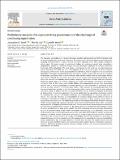| dc.description.abstract | The emergence and proliferation of In-space Servicing, Assembly, and Manufacturing (ISAM) technology holds far-reaching implications, particularly considering the current era of rapid advancements in space technology, escalating commercialization of space activities, and novel utilization of the space domain including in cislunar space. This paper presents the preliminary findings of a multi-year research study undertaking a comprehensive analysis of commercial in-space servicing governance employing the Systems Architecture Framework (SAF) methodology. The focal points of investigation for this study are on understanding the various dimensions that shape the policy and regulation of the commercial in-space servicing ecosystem, encompassing environmental factors and sociopolitical considerations, from the perspective of U.S. Government Stakeholders. Governance of commercial in-space servicing is a complex system in the sense that it is composed of interacting components whose collective behavior and properties emerge from the relationships between these entities. Through the use of SAF, the analysis of this complex socio-environmental-technical system spans these elements: understanding system Context, analyzing Stakeholders and their Needs and Objectives, identifying system Forms and Functions, proposing new Forms and Functions, and Monitor and Evaluate the system. From the SAF analysis, several major findings and recommendations emerge. First, shortcomings currently exist in achieving meaningful continuing supervision by the Stakeholders of commercial in-space servicing activities. Article VI of the Outer Space Treaty of 1967 mandates the continuing supervision of all non-governmental space activities by the authorizing nation yet lacks a clear definition for the term continuing supervision. Based on analysis from SAF, this paper introduces tools for addressing ambiguity by providing an interpretation of continuing supervision that can be applied into the operational environment, metrics for evaluating the outcomes, and technical challenges and recommendations for continuing supervision in cislunar. This paper also introduces a recommendation for a Decision Support System (DSS) for aiding U.S. Government Stakeholders in authorizing and supervising commercial in-space servicing activity based on findings from expert interviews. The authors propose that the Environment-Vulnerability-Decision-Technology (EVDT) systems engineering framework developed by the Space Enabled Research Group offers a promising methodology for developing such a DSS as future work. The framework allows system designers to confirm they are addressing Stakeholder Needs identified via the Systems Architecture Framework and combining a variety of sources of information to shape policy. Notably, the EVDT framework has been previously demonstrated as a tool for decision-making in space traffic management applications for a U.S. Stakeholder. Future work of this research study will investigate prototyping a new space-based EVDT model for specific use-cases and exploring a sensitivity analysis of the space environment to certain in-space servicing activities. Ultimately, this research lays a robust foundation for a deeper understanding of the current and future U.S. governance of commercial in-space servicing, resonating with the ongoing discourse concerning the long-term sustainability, mission authorization, and continuing supervision of novel space activities. The insights derived from this multi-year analysis contribute valuable guidance for policymakers, industry leaders, and academic researchers, offering a Stakeholder-focused perspective informing strategic decisions with socio-environmental-technical implications at the forefront. | en_US |
| dc.identifier.citation | Jacqueline H. Smith, Moriba Jah, Danielle Wood, Preliminary analysis of in-space servicing governance and the challenge of continuing supervision, Acta Astronautica, Volume 234, 2025, Pages 690-706, ISSN 0094-5765, https://doi.org/10.1016/j.actaastro.2025.04.046. | en_US |
